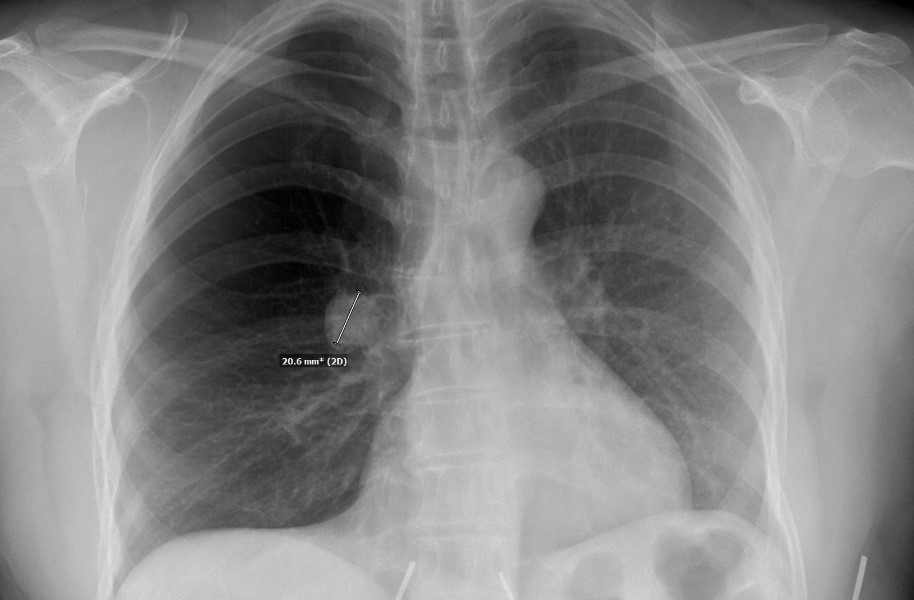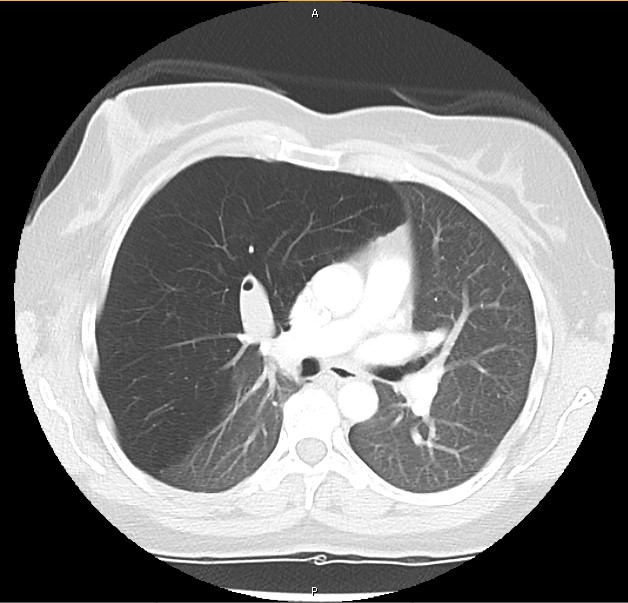A Patient with Lifelong Episodes of Shortness of Breath
Author: Thomas Wong, MD
Case
A 43-year-old woman from Mexico, with lifelong episodes of paroxysmal dyspnea and infrequent bouts of pneumonia as an adult, presented for evaluation of worsening shortness of breath.
The cause of her dyspnea and hyperlucency on plain radiograph was found to be:
- Foreign Body Aspiration
- Endobronchial Tumor
- Bronchial Atresia
- Swyer-James Syndrome
Bronchial Atresia
The patient's initial chest x-ray demonstrates a right upper lobe hyperlucency and a corresponding opacity extending from the hilum concerning for congenital bronchial atresia. CT imaging of the chest confirmed the diagnosis, showing a right upper lobe cystic malformation; bronchoscopy later showed an absence of the right upper lobe bronchus and mucus impaction of the right lower lobe bronchus. Since her symptoms were not overly bothersome and spirometry showed only a mild obstructive pattern, the patient was initially managed conservatively with bronchodilators and airway clearance protocol. However, over the next six years, her dyspnea and sputum production persisted, and she sought more definite therapy. Repeat pulmonary function testing was significant for residual volume/total lung capacity ratio of 0.53, significant for air trapping. She underwent bilobectomy through a video assisted thoracoscopic approach. Intra-operative findings interestingly showed not only a cystic malformation of the right upper lobe and right upper lobe bronchial atresia, but also an absence of the right middle lobe bronchus. Pathology was negative for malignancy. Post-operatively, the patient's dyspnea resolved.
Congenital bronchial atresia is a rare congenital malformation leading to early termination of affected bronchi but intact distal parenchymal lung development. It is an uncommon condition with an incidence of 1 case per 100,000 individuals. Mucus impaction, bronchocele formation, lung hyperinflation through collateral ventilation, and recurrent infections are possible pathophysiologic sequelae of this disorder. This rare case of bilobar bronchial atresia illustrates the diagnostic imaging findings on plain radiograph that are highly suggestive of congenital bronchial atresia and should prompt pursuit of confirmatory workup with CT imaging and/or bronchoscopy.
In addition to bronchial atresia, the differential diagnoses for unilateral lung hyperlucency on chest radiograph includes: 1) endobronchial obstruction via foreign body aspiration or tumor (which was not consistent with the patient's history or further work up including pathology); 2) Swyer-James Syndrome, a syndrome secondary to childhood post-infectious bronchiolitis obliterans which can lead to bronchiectasis and hypoplastic pulmonary arteries (not observed in this case and patient denied childhood respiratory illnesses); 3) bullae (not present on chest CT); and 4) pulmonary embolism, in which a large thrombi results in oligemia to the affected lung (also not seen on chest CT).
Most instances of congenital bronchial atresia are found incidentally, and conservative management is pursued. However, this case illustrates that a minority of patients require surgical intervention to alleviate their symptoms, prevent complications, or exclude underlying malignancy. Awareness of this diagnosis can avoid potentially unnecessary surgical intervention in the majority of bronchial atresia patients who are minimally symptomatic.
Thomas Wong, MD Internal Medicine Resident
Jigar Patel, MD Pulmonary Critical Care Fellow
Sara Swenson, MD, FACP
Randall Edson, MD, FACP, PD
California Pacific Medical Center
2351 Clay St.
Suite 360
San Francisco, CA, 94115
wongtj@sutterhealth.org | 808-255-5801
Resources:
-
Mahajan AK, Rahimi R, Vanderlaan P, Folch E, Gangadharan S, et al. Unique Approach to Diagnosing and Treating Congenital Bronchial Atresia (CBA): A Case Series. J Pulm Respir Med. 2017; 7:402. doi: 10.4172/2161-105X.1000402
-
Traibi A, Seguin-Givelet A, Grigoroiu M, Brian E, Gossot D. Congenital bronchial atresia in adults: thoracoscopic resection. Journal of Visualized Surgery. 2017;3:174. doi:10.21037/jovs.2017.10.15.
-
Nemec S, Bakier A, Eisenberg R. Pulmonary Hyperlucency in Adults. American Journal of Roentgenology. 2013, 200: W101-W115. 10.2214/AJR.12.8917





